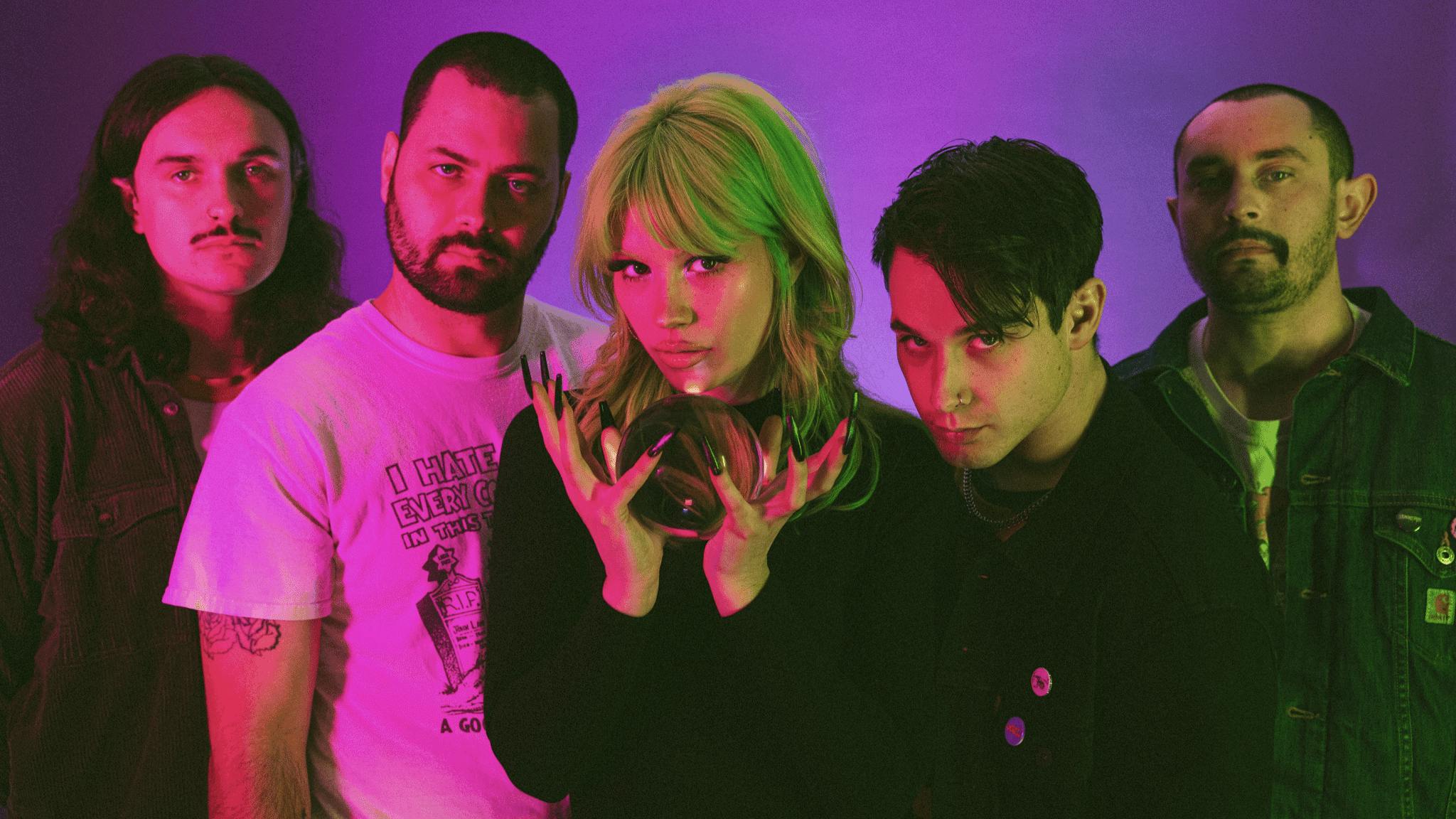It’s on the precipice between opening up or holding back, weighing up the risks, choosing bravery or comfort, that the psychic dance routine happens.
“It’s the mental gymnastic, the bending over backwards, the inner dance routine that you might be doing with someone, whether it’s a partner or a friendship or a community, or yourself,” Kat explains. A synonym that might come up in a therapy session is ‘the intimacy tango’ – one person stepping back as the other steps forward, unsure if they can surrender themselves fully or if doing so will cause them hurt. It’s relevant to Kat in that sense, too.
“I didn’t realise how afraid of emotional intimacy I was with the world and people around me,” she admits. “Do I step forward? Do I step back? The people that are closest to me, am I sharing with them truly, do they feel seen by me and what I choose to share? I tend to put a lot of pressure on myself with this stuff.”
It’s this image that gives Scowl’s new EP, and one of its songs, its title and becomes the central metaphor that embodies its concept. Kat is working through her dilemma loud enough for Scowl’s audience to hear, and it is, simultaneously, her way of challenging herself to bulldoze through her fears and let herself embrace the kind of honesty that makes for all the greatest art. In a way, it was emotionally-open by necessity, both for her to work through her thoughts on the matter, and for her to connect with whoever was listening on a new level.
“After I wrote everything and we recorded it, I had a nervous moment. I was like, ‘Oh fuck, do I really want everyone to hear this?’” she reveals. “I was really scared before we put the EP out. It didn’t really hit me until after we recorded it just how vulnerable I got with some of the lyrics. ‘Do I really want everyone to have access to that part of me?’ But I was also like, ‘I need to show humanity, I need to show that I’m a person.’”
In a way, it was as much of a means of expansion and growth as the EP’s new forays into previously unexplored sounds that Scowl melded with their hardcore template. The sort of bludgeoning, breakneck verses that characterised How Flowers Grow rub shoulders with choruses that pay homage to the music Kat loves outside of the hardcore world she calls home, specifically the sorts of alt.rock that blared from radios in the ’90s and ’00s. The visuals for the Psychic Dance Routine singles were also taken as an opportunity to experiment. In a way, they made the confrontation Kat has with herself in the lyrics literal.
When the band were filming the video for lead single Opening Night, Kat found herself constantly apologising when she was performing in front of the camera. Being watched through a lens made her self-conscious. The things she thought were coming off as weird everyone else perceived as good. So, while in theory she needn’t have worried, anyone with a pulse and a nervous system would know that intentionally not worrying is harder to do in practice.
“I had a couple of conversations with myself this past year where I was like, ‘I can’t let my fear of attention get in the way of my ability to perform and what deep down I know I have the ability to do,’” Kat says. “I was so scared of being judged, which is ridiculous. I think I’ve always been afraid of embarrassing myself. Having all of the attention on you as part of being in a band, I’ve kind of struggled with that a bit. But now I think I’m finally accepting it.”
In the spirit of defeating that self-consciousness, Kat decided she would learn a dance for the title-track’s video. There’s a feeling of being exposed, too – she’s alone in a studio, dressed in a black dress and knee-high white go-go boots. It’s clearly a lo-fi kind of video, nothing glossy or big-budget about it, but Kat cannot hide the fun she’s having, even if she’s not used to doing anything like this.
“I wanted to be ambitious, and I wanted to send this message that, ‘Hey, you can be in a DIY band and have a really small budget, and you can still do the stuff that you felt seen by on the TV when you were a kid.’ It’s silly because I’m in a hardcore band, but I don’t care, I’m going to have fun and I’m going to commit to that.”
The lyrics see Kat put her feelings in the third person – ‘She’ll never be your animal / She’s got her own personal hell’ – to emphasise her story as a specifically feminine experience.
“[I did that to] break out of a fear of turning off half our audience, because half of our audience is probably male,” Kat reasons. “I don’t go out of my way to only please that half of our audience, but I never wanted to alienate them. But at the same time, I was like, ‘Look, I want to write a song about this experience that only some of you guys will [identify with], and everyone can take what they want and relate to it no matter what.’ There’s no rules, but I needed to speak on my behalf in that situation.”
